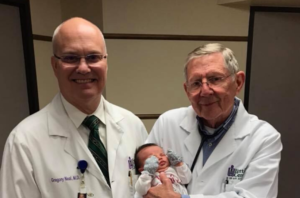Discover your path to parenthood today.
Determining Causes of Infertility
There are several potential causes of infertility, all of which our highly trained specialists in San Antonio, TX, can explain during your private consultation. While many patients believe that the causes of infertility stem primarily from women, in reality, there is a 30-40% risk of a male factor as well.
For both men and women, there are a number of potential causes of infertility, ranging from medical conditions to environmental factors. By determining the cause of infertility, we can strategize treatment methods to help you and your partner conceive.
To learn more about the causes of infertility, or to discuss your case in-depth, contact the Fertility Center of San Antonio to schedule a consultation.
Causes of Infertility in Males
Irregular Sperm Production or Function
The atypical production or function of sperm is a primary cause of infertility. Average sperm production is typically greater than 20 million sperm per milliliter of semen. A sperm count less than this indicates low sperm production. Factors that may contribute to irregular production or function of sperm including those cells that produce sperm:
- Varicocele, or dilated veins
- An undescended testicle
- Testicle disorders and hormonal imbalances
- Various infections, including sexually transmitted diseases (STDs)
Issues with Sperm Delivery
Complicating factors that inhibit the ejaculation of sperm into the vagina can also impact fertility. Common causes of sperm delivery problems include:
- Sexual issues, which are often treatable, including erectile dysfunction (ED), improper technique, or pain during intercourse
- Retrograde ejaculation, in which semen enters the bladder rather than exiting the penis, usually caused by medical conditions such as diabetes, or certain surgeries
- A blockage in the testicles or ejaculatory ducts, which is typically present at birth
- A lack of semen (ejaculate), which carries the sperm, most common in men who have suffered spinal cord injuries or certain diseases
Exposure to Environmental Factors
A man’s overall health, lifestyle, and environment can also impact fertility. Common factors may include:
- Alcoholism or drug use
- Chronic stress
- Medical conditions, such as diabetes and thyroid disease
- Exposure to excessive heat, such as frequent use of saunas or hot tubs
- Exposure to pesticides or chemicals
- Obesity
- Smoking tobacco
Cancer & Cancer Treatment
Cancer treatments such as chemotherapy work by destroying rapidly dividing cells. Unfortunately, chemotherapy not only targets cancerous cells; it also targets healthy cells, including sperm.
It is difficult to predict how a male patient’s fertility will be affected by chemotherapy because this is largely dependent on the type and number of drugs received. Additionally, certain cancers may affect fertility even before treatment begins, including Hodgkin’s disease and testicular cancer.
We will work with you every step of the way to successfully identify and address any factors that could be impacting your ability to conceive.
Causes of Infertility in Females
Ovulation Disorders
Ovulation disorders such as anovulation and oligoovulation are some of the most common causes of infertility in women. In a majority of cases, such disorders are treatable. Factors that may affect ovulation include:
- Hormonal imbalances
- Scarring of the ovaries
- Premature menopause
- Follicle problems
In much less common cases, ovarian torsion can occur. This condition can result in the loss of an ovary if swift action is not taken.
Uterine or Cervical Complications
Physical abnormalities and other issues affecting the uterus or cervix can cause infertility, including past surgeries, abnormal cervical mucus, uterine polyps, uterine fibroids, intrauterine adhesions, uterine septum, and more.
Fallopian Tube Damage
Damage to the fallopian tubes, sometimes referred to as tubal disease, affects as many as 25 percent of women. The most common treatment for tubal disease is surgery. Causes of fallopian tube damage may include:
- Infections, such as an STD
- Abdominal diseases, such as appendicitis or colitis
- Prior pelvic or abdominal surgeries
- Previous ectopic, or tubal, pregnancies
- Congenital tubal defects
Endometriosis
Affecting between six and seven percent of women in the U.S., endometriosis causes infertility in nearly 50 percent of those who live with this condition. Endometriosis results in excessive uterine lining, which may also occur outside of the uterus and affect the fallopian tubes, the ovaries, and more.
Some patients with endometriosis suffer symptoms such as painful, heavy, and lengthy menstrual cycles. Other patients experience no symptoms at all.
Cancer & Cancer Treatment
Women are susceptible to a number of cancers that can affect the reproductive organs, including ovarian, cervical, and uterine cancers. Additionally, cancer treatments such as chemotherapy can damage a woman’s eggs. Other treatments, such as radiation therapy, can damage a woman’s ovaries, affecting her fertility.
Contact Us
If you and your partner are suffering from infertility, contact the Fertility Center of San Antonio to schedule a consultation with one of our esteemed specialists.
We will work with you every step of the way to successfully identify and address any factors that could be impacting your ability to conceive.











